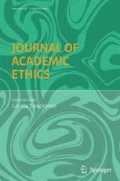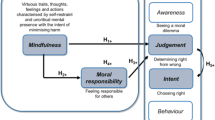Abstract
This paper seeks to provide some of the roles of philosophy in the field of academic ethics.
Similar content being viewed by others
Notes
I resist, then, attempts to construe the legitimate scope of the academy to what are deemed traditional canonical subject areas and viewpoints as articulated in Strauss (2006) and Bloom (1987), among many others. I am neither a relativist nor a subjectivist about the legitimate subjects of inquiry in college or university contexts. But nor am I a traditionalist who thinks that a historical and traditional “canon” ought to be the be all and end all of what ought to be taught in higher education. Human knowledge and the pursuit of truth and avoidance of error know few bounds. However, I do not pretend to know the precise limits of such bounds.
A discussion on the relationship between tenure and academic freedom is found in Roepnack and Lewis (2007). The authors also include discussions of some arguments for and against the institution of tenure, especially insofar as it is based on the idea that it best guarantees academic freedom.
This point is made with reference to racist language in Corlett (2003, p. 78).
That there are many faculty who fail to confront student academic dishonesty is discussed in Coren (2011, 2012). One reason why some faculty do not confront student academic misconduct that the author fails to address is that of the faculty member’s perception of the inadequacy of her institution in punishing the misconduct.
Oakshott (2006), see especially p. 16.
An exception might be an introductory-level textbook.
Some such insights can be found in a variety of sources, including Scriven (2006).
Corlett, “The Good Professor;” “The Value of Intercollegiate Athletics in Universities.” Ironically, in most such cases the increased teaching load for research underproductive faculty would eventuate in their never being able to publish enough to regain their lesser teaching loads.
An example of a very poorly worded student evaluation form is at San Diego State University at least in the College of Arts and Letters for several years until about 2000 wherein faculty were required to administer a questionnaire to students at the end of each term which included questions like: “What grade do you expect to receive in this course?” “Do you believe the instructor is a fair grader?” etc. Astoundingly, I was the only faculty member I knew who objected to that “instrument of evaluation” of faculty. Of course, grade inflation was and is especially rampant at SDSU, while SDSU sometimes touts that its faculty are much appreciated by its students. As soon as the Dean of the college asked for departments to devise their own student evaluation forms, I immediately volunteered and led the charge for the department to completely re-write its own questions for the document. There is nothing in the current document that even refers to grading. Unsurprisingly, however, this measure has seemingly done nothing to curb grade inflation.
All of this holds even if it is true that, as Deborah Poff points out, that grade inflation is symptomatic of deeper problems in higher education: Poff (2008).
I do not have in mind here those who, because of physical or temporary psychological reasons, cannot perform their faculty duties according to a reasonable norm of productivity.
Those who register doubt that there ought to be a code of academic ethics include Callahan (2006).
References
Aristotle. (1984a). Nicomachean ethics. In J. Barnes (Ed.), The complete works of Aristotle (Vol. 1, pp. 1729–1867). Bollingen: Princeton University Press.
Aristotle. (1984b). Metaphysics. In J. Barnes (Ed.), The complete works of Aristotle (Vol. 1, pp. 1552–1728). Bollingen: Princeton University Press.
Aristotle. (1984c). Physics. In J. Barnes (Ed.), The complete works of Aristotle (Vol. 1, pp. 315–446). Bollingen: Princeton University Press.
Bloom, A. (1987). The closing of the American mind. New York: Simon and Schuster.
Boxill, B. (1984). Blacks and social justice. Totowa: Rowman & Littlefield Publishers. Chapter 7.
Brand, M. (2006). The role and value of intercollegiate athletics in Universities. Journal of the Philosophy of Sport, 33, 9–20.
Brown, D. G. (2007). On doffing the mask. Journal of Academic Ethics, 5, 217–219.
Callahan, D. (2006). Should there be an academic code of ethics. In R. Barrow & P. Keeney (Eds.), Academic ethics (pp. 581–592). Aldershott: Ashgate.
Coren, A. (2011). Turning a blind eye: faculty who ignore student cheating. Journal of Academic Ethics, 9, 291–305.
Coren, A. (2012). The theory of planned behaviour: will faculty confront students who cheat? Journal of Academic Ethics, 10, 171–184.
Corlett, J. A. (Ed.). (1991). Equality and liberty: analyzing Rawls and Nozick. London: MacMillan.
Corlett, J. A. (2003). Race, racism, and reparations (p. 78). Ithaca: Cornell University Press.
Corlett, J. A. (2004). Ethical issues in journal peer-review. Journal of Academic Ethics, 2, 355–366.
Corlett, J. A. (2005). The good professor. Journal of Academic Ethics, 3, 27–54.
Corlett, J. A. (2008). The ethics of academic journal editing. Journal of Academic Ethics, 6, 205–209.
Corlett, J. A. (2013). On the role and value of intercollegiate athletics in Universities. Journal of Academic Ethics, 11, 199–209.
DeGeorge, R. T. (2006). Ethics, academic freedom, and academic tenure. In R. Barrow & P. Keeney (Eds.), Academic ethics (pp. 329–344). Aldershott: Ashgate. especially p. 337.
Elshtain, J. B. (2006). The politicization of the university and its consequences. In R. Barrow & P. Keeney (Eds.), Academic ethics (pp. 53–64). Aldershott: Ashgate.
Feinberg, J. (1984–1990). The moral limits of the criminal law (Vol. 4). Oxford: Oxford University Press.
Feinberg, J. (1992). Freedom and fulfillment. Princeton: Princeton University Press. Chapter 5.
Fox, R. W. (2006). A heartbreaking problem of staggering proportions. In R. Barrow & P. Keeney (Eds.), Academic ethics (pp. 503–508). Aldershott: Ashgate.
Grossberg, M. (2006). Plagiarism and professional ethics - a journal editor’s view. In R. Barrow & P. Keeney (Eds.), Academic ethics (pp. 509–516). Aldershott: Ashgate.
Kekes, J. (2006). Academic corruption. In R. Barrow & P. Keeney (Eds.), Academic ethics (pp. 131–144). Aldershott: Ashgate.
Lehrer, K. (2000). Theory of knowledge (2nd ed.). Boulder: Westview Press.
McCabe, D. L., & Trevino, L. K. (2006). Academic dishonesty: honor codes and other contextual influences. In R. Barrow & P. Keeney (Eds.), Academic ethics (pp. 545–562). Aldershott: Ashgate.
McGary, H. (1999). Race & social justice. London: Blackwell.
Mill, J. S. (1865). On liberty: people’s edition. London: Longman’s, Green, and Co.
Nozick, R. (1974). Anarchy, state, and utopia. New York: Basic Books.
Oakshott, M. (2006). The idea of a university. In R. Barrow & P. Keeney (Eds.), Academic ethics (pp. 9–16). Aldershott: Ashgate.
Park, C. (2006). Other (people’s) words: plagiarism by university students - literature and lessons. In R. Barrow & P. Keeney (Eds.), Academic ethics (pp. 525–544). Aldershott: Ashgate.
Poff, D. (2008). Review of James Ĉoté and Anton Allahar, Ivory tower blues: a university system in crisis. Journal of Academic Ethics, 6, 177–179.
Rawls, J. (1971). A theory of justice. Cambridge: Harvard University Press.
Roepnack, B., & Lewis, C. W. (2007). Academic freedom and academic tenure: Can they survive the marketplace of ideas? Journal of Academic Ethics, 5, 221–232.
Rollins, C. D. (1967). Solipsism. In P. Edwards (Ed.), The encyclopedia of philosophy (Vol. 7, pp. 487–491). New York: Macmillan Publishing Company, Inc. & the Free Press.
Rosamond, B. (2006). Plagiarism, academic norms and the governance of the profession. In R. Barrow & P. Keeney (Eds.), Academic ethics (pp. 517–524). Aldershott: Ashgate.
Schurr, G. M. (2006). Toward a code of ethics for academics. In R. Barrow & P. Keeney (Eds.), Academic ethics (pp. 563–580). Aldershott: Ashgate.
Scriven, M. (2006). Professorial ethics. In R. Barrow & P. Keeney (Eds.), Academic ethics (pp. 267–278). Aldershott: Ashgate.
Searle, J. (2006). The prospects for the university. In R. Barrow & P. Keeney (Eds.), Academic ethics (pp. 105–130). Aldershott: Ashgate.
Shatz, D. (2006). Is peer review overrated? In R. Barrow & P. Keeney (Eds.), Academic ethics (pp. 345–374). Aldershott: Ashgate.
Shils, E. (2006). The academic ethic. In R. Barrow & P. Keeney (Eds.), Academic ethics (pp. 35–54). Aldershott: Ashgate.
Strauss, L. (2006). What is liberal education? In R. Barrow & P. Keeney (Eds.), Academic ethics (pp. 3–8). Aldershott: Ashgate.
Turner, L. (2003). Doffing the mask: Why manuscript reviewers ought to be identifiable. Journal of Academic Ethics, 1, 41–48.
Author information
Authors and Affiliations
Corresponding author
Additional information
This paper constitutes a revised version of the keynote address for the Conference on Academic Ethics, Aristotle University of Thessaloniki, Thessaloniki, Greece, 11–12 October 2013. I am especially indebted to Filimon Peonditis both for his excellent editorial revisions and his translating this lecture into Greek for audience members. I am also grateful to the incisive comments of referees for the Journal of Academic Ethics and to its editor for helpful comments that improved this paper.
Rights and permissions
About this article
Cite this article
Corlett, J.A. The Role of Philosophy in Academic Ethics. J Acad Ethics 12, 1–14 (2014). https://doi.org/10.1007/s10805-014-9201-7
Published:
Issue Date:
DOI: https://doi.org/10.1007/s10805-014-9201-7




